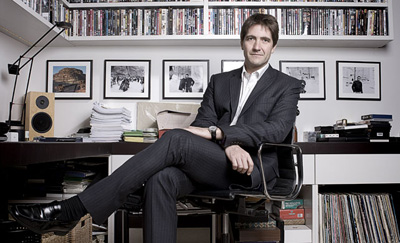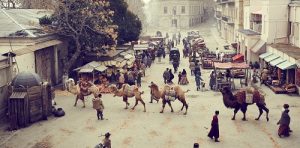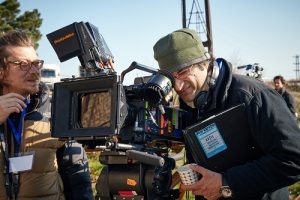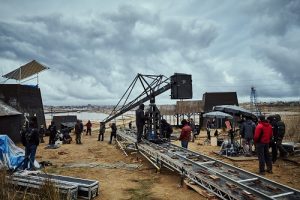

At A Glance
Kris Thykier is an eclectic producer whose work covers notable and diverse titles such as Miss Sloane, Woman in Gold, Kick Ass to Harry Brown. Titles in which he has worked with remarkable talent including Jessica Chastain, Dame Helen Mirren, and Sir Michael Caine. But is his latest feature, epic period love story Ali and Nino his biggest challenge to date? I was lucky enough to find out.

Film Details
Directed by Asif Kapadia
Written by Christopher Hampton
Based on the book by Kurban Said
2018, 100 minutes
Available on Blu-ray and DVD
Cast
Adam Bakri as Ali Khan Shirvanshir
María Valverde as Nino Kipiani
Mandy Patinkin as Gregor Kipiani
Connie Nielsen as Duchess Kipiani
Homayoun Ershadi as Ali's Father
Kris Thykier - Interview
“It was slightly as sort of kind of mad endeavour. I guess I just wanted to make a slightly old fashioned, big epic romance, which are not particularly in vogue, but they’re the sort of movies I rather love, you know that was the intension, it became a labour of love to try and get it off the ground,” remarks Kris.
Based on the book Ali and Nino, it is considered the Azerbaijani Romeo and Juliet, but what was it in particular that spoke to him?
“I think you kind of stumble across things that you slightly fall in love with. For me there was a joy of something that felt like it was a world that no one had seen, there was the idea of grand, tragic love. But also what was special about it, it felt to me despite it being a period piece there was something remarkably contemporary about it. The notion of a Muslim boy and a Christian girl, and a love that can span cultures and faiths, I felt was quite an important thing to be talking about now. In a world where we are riven with differences and the clash of cultures, if you like. I like the idea of the notion that love could transcend differences in culture, differences in faith, differences in societal expectations. So for me that was almost the more important part of it, was to try and emphasize that aspect of it, and so (I) guess that was what interested me. I think I’m a romantic at heart, so I’ll be swayed by grand tragic love, but in a way the specificity of the challenges that the couple Ali and Nino had to overcome, I thought was remarkable contemporary.”

“If we start with the source material it’s incredibly evocative, it’s evocative of a time and a place that I don’t think people really know anything about, you know, and the period also has big ramifications in terms of the status of that part of the world today. Love of country is another subject that I think is remarkably contemporary. What was interesting about Ali’s love for his country and sense of a need for independence, and for the ability to be in charge of one’s own destiny.”
“Now, at the moment the dark side of that is populism, jingoism and xenophobia and again in a way I thought was interesting about Ali’s journey was it was about the destiny of his people and their national identity, but it wasn’t necessarily at the expense of other people. It was love for one’s country without those dark aspects of xenophobia, which again is something worth thinking about in a world that is riven with populism. So yeah I guess on that level it’s a love story in two parts.”
The screenplay was written by Dangerous Liaisons and Atonement screenwriter Christopher Hampton, who created a politically impartial story. The Bolsheviks were not depicted as ‘the baddies’, was that always the intent?
“Yeah, you know ultimately the soldiers on the ground are human beings, and they’re caught up in a sweep of geopolitics, so I didn’t want to caricature either side as being innately evil. The fact is this was a time when empires were being created and dismantled, and so that’s much more at a geopolitical level than on a local one, so we were resistant to try and caricature anyone as innately evil, these were people swept up in a tide of history.”

Little is known of Azerbaijan and its capital city Baku, where our lovers reside. The story covers a two year span, starting in 1918. So I wondered to the historically accuracy of the film?
“It was important that we shot in the real places, and we had an authenticity to what we were showing on screen. So it’s difficult when you are trying to make a film that is a fictional story, set against historical fact. You want to try and walk that fine line between history and documentary and drama. But I think if you get it right I think audiences want to learn and find out information, you just need to make sure it doesn’t feel like vegetables (laughs). So in a way the joy of being able to go and shoot in a country that people didn’t know much about, and a history they didn’t know about, going to and shoot in the real place affected everything. It meant that you didn’t have to go through the hard work of walking people through piece by piece through history, because you were surrounded by it.”
Ali and Nino, it is considered the Azerbaijani Romeo and Juliet
Interestingly Kris mentions documentary, as Senna and Amy director Asif Kapadia helmed Ali and Nino, but was that the reason why?
“He is a brilliant documentary filmmaker, but the film that inspired me to work with him was actually The Warrior which was his first film out of film school. He had made dramatic films before he moved into documentaries, and of course he’s better known for documentaries now, but that first film which was set in India, and very much tied in to his culture.”
“I think he has a documentarian’s instinct for authenticity, interestingly it was his sense of romance that was special, and actually Senna is a film filled with heart. I think those documentaries work because they are incredibly emotive, not factually driven. I think in a way, yes he is someone who seeks authenticity, but in a way the thing that attracted us in the first place was that he was someone who directs from the heart.”

In a country that doesn’t have a local film industry, did the lack of local resources and knowledge to draw upon present a challenge?
“What’s interesting is that the country was a part of the Soviet Union, from basically the end of the film until the ‘90s. So there was a tradition of cinema that Lenin sort of proclaimed at the outset of the Soviet Union, that cinema was going to be the great art form of the new socialist order. So there had been investment of film, and there was big sort of studios in Baku, but those had been crumbling for the last 20 years. So in a way there was a sort of history of cinema in the country, but the technicians and the technical side of things had been allowed to dissipate a bit over the last couple of decades. And so in a way they rather love cinema and film, but the infrastructure wasn’t there anymore, but in that regard it was nice was being able to take a large scale film in there, and start to work with a new generation of Azeris, who were very keen to be involved.”
“We were fortunate that we worked with the government of Azerbaijan they gave us a lot of access. Access to buildings, they shut roads, you know there were lots of things where I think partly because it’s their national story. It’s a very, very famous emotive book in that region not just in Azerbaijan, but also in Georgia where Nino is from. So we had a lot of help and assistance, and I think as soon as they knew that we wanted to be true to the book, and tell this story well, they were incredible supportive.”
“And in terms of local people, we tried as much as possible. We brought a lot of people over from Turkey, partly because the (of) Azeri language and the Turkish language, they can speak to one another. Some international crew and some crew from the UK, but we were keen to bring through a generation of people and introduce them to filmmaking and production on the ground, and that was fun.”
In front of camera the cast are hugely multicultural, Ail is played by Adam Bakri a Palestinian-Israeli actor, Nino played by Spanish actress María Valverde, Gladiator’s Connie Nielsen is from Denmark.

Was it a challenge to get everyone together?
“Yes it was, I think where possible, you go who are the best possible actors for these roles. There’s some theatre and some opera, but there’s not an awful lot of screen talent in the area. One of our issues was language, we wanted to make it in the English language to give it the best possible chance of international audience. Again trying to find actors from the region, especially the older actors that could speak English was complicated. We had to spread the net wide, but we wanted to make it feel of a place and diverse as possible.
“I’ve wanted to work with Mandy Patinkin since Princess Bride (laughs), so to be honest the joy of finding an actor of Mandy’s stature (who) was taken by the material.”
In front of camera the cast are hugely multicultural
“Everyone saw it as a grand adventure, these films are made rarely. It was amazing how people rose to the challenge. We were often shooting in very remote places, there were no star trailers, often the hotels were small and functional (laughs). What we were fortunate to have was a cast of great actors who all joined in and wanted to be part of it.”
“Baku is a very modern glamourous city, so there was a little bit of both, there was some five star and some no stars (laughs).
Picking up on how these kind of films aren’t made any more, from a business perspective was it tricky to find investors and funding for the film?
“It was a challenge, we had a lot of support. We knew in that region there would be an audience and it’s the biggest film there has ever been in Azerbaijan and very successful in Georgia and very successful in Kazakhstan, so there was a regional push for it. Because the book was a beloved, there was a will to bring it to life.”
“At various points this book has been a global best seller. I think in a way, that was the key, if it hadn’t had that built in audience, recognition and passion for the source material then I think it would have been much harder.”

Kris picked up on a very interesting point regarding the current climate and demand for drama in cinemas.
“It’s difficult. Drama as a theatrical proposition is pretty tough these days. The flip side of that is that we have the golden age of television drama, and people are doing all sort of things that are fascinating on a smaller screen. But the theatrical movie experience is much more being siloed into horror, kids, spectacle and comedy. Those are the big commercial players, and it doesn’t mean that drama doesn’t have a place, but it’s becoming tougher and tougher to attracted audiences.”
“We felt that this would be likely to be an older audience, and also an adult audience, but we felt there were still people that wanted to be taken on into a great sweeping landscape and go on an emotional journey of a grand romance.”
Nino in the film differs from the book, in the respect that she is much more of an equal to Ali.
“The funny thing is when you dig into the book it’s incredibly evocative of a period, but it is also written in a period of time which was far more male dominated. So when we start to look into the book the love story was genuine, there was clearly a love story between these two people. The book is very much told from Ali’s point of view, and I think we felt that it made sense in order for the love story to really land, both of these characters need to be full and three dimensional, and put quite a lot of work into making Nina his equal. The fact was it went against all sorts of morays at the time in terms of his choice of her, and her choice of him, we needed to feel that they were equals, and that we needed to spend quite a long time drawing Nino a little more fully than she is in the book, that was clear. Again partly we live in a world currently where there has been a lack of strong female characters, we needed to make sure that Nino felt as strong and as empowered as Ali. Ultimately they had to fall in love for a reason, and he needed to fall in love with someone who was his soul mate.”

Kris Thykier upcoming project is Tolkien, a biopic based on The Lord of the Rings author, J.R.R. Tolkien.
Ali and Nino - Official Trailer
Claire Bueno
Claire Bueno is a film journalist, presenter and interviewer, having moderated BAFTA, Royal Television Society (RTS), Women in Film and Television (WFTV), and Apple Store Q&As and hosted Comic Con panel talks. Claire is the founder of Premiere Scene Magazine and has had the privilege of interviewing esteemed artists including Tom Cruise, George Clooney, Brad Pitt, Sir Anthony Hopkins, Sigourney Weaver, Emily Blunt, Samuel L Jackson, James Cameron and Andy Serkis.
As a media coach Claire works with leading personal publicists, HBO, Netflix, Sky, ITV, Penguin Random House, the BFI, DDA, MacMillan and Premier, offering practical coaching sessions and safe environment for talent to perfect their interview technique before facing the press. She has extensive experience working with emerging and seasoned professionals and where English is not their first language.
Additionally, Claire is the producer of the critically acclaimed feature documentary CLEANIN’ UP THE TOWN: Remembering Ghostbusters and the upcoming TOO HOT TO HANDLE: Remembering Ghostbusters II.